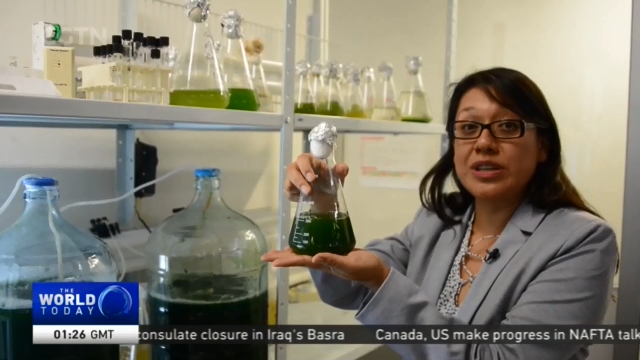
09:55, 01-Oct-2018
Clear the Air: Mexican company uses algae to purify Puebla's polluted air
Updated
09:10, 04-Oct-2018
03:22

As renewable energy technology advances, the aim for many innovators is to reduce carbon emissions and create a greener future. In Mexico, an award-winning system is seeking to do both at the same time, as CGTN's Alasdair Baverstock reports.
Puebla, in central Mexico, is one of the country's, and the world's most polluted cities. But it's also where a new type of air purifier got its start. The filtration system has won international recognition for its use of microalgae to clean the atmosphere. It's called the BioUrban and was invented by biologist and entrepreneur Carlos Monroy.
CARLOS MONROYBIOMITECH FOUNDER "Algae has the ability to break down compounds faster than trees. There is a statistic which tells us that 75 percent of the oxygen we breathe comes from the sea, precisely from these organisms. And over the course of a day, they can multiply two or three times, so this natural characteristic allows it to process large quantities of oxygen."
But don't just take Carlos's word for it. His invention recently won the prestigious Innovation Award at the Contamination Expo Series 2018, held in Birmingham, England.
ALASDAIR BAVERSTOCKPUEBLA "Using only algae, the sunlight, and a simple pump to push the air through it, the BioUrban purifier contributes the same amount of oxygen to the atmosphere as 400 trees. The enormous potential of the photo synthesizing algae has been harnessed across the city - at heavy traffic intersections."
Alberto Vivas is the minister for transport in Puebla City. He says residents have embraced the purification system.
ALBERTO VIVAS PUEBLA CITY TRANSPORT MINISTER "They like it when you can offer them more public spaces, and also while being in a city, that you can be in a place where there are trees, or you can be peaceful, and you can have a relaxing moment in the middle of it all."
There are plans by BiomiTech, the purifier's parent company, to install systems within the London Underground railway system. But algae's potential isn't limited to air purification. It's a science that biologist Rocio Ramirez says can change the world.
ROCIO RAMIREZALGAE BIOLOGIST "From these small organisms we can obtain fats, carbohydrates and proteins, which can be used for food, as well as energy, and also for bio-medicine. There are many organizations around the world which are betting on algae."
Developers say with just one device, they can transform carbon dioxide and process enough oxygen equivalent to nearly 400 trees. Alasdair Baverstock, CGTN, Puebla.

SITEMAP
Copyright © 2018 CGTN. Beijing ICP prepared NO.16065310-3
Copyright © 2018 CGTN. Beijing ICP prepared NO.16065310-3